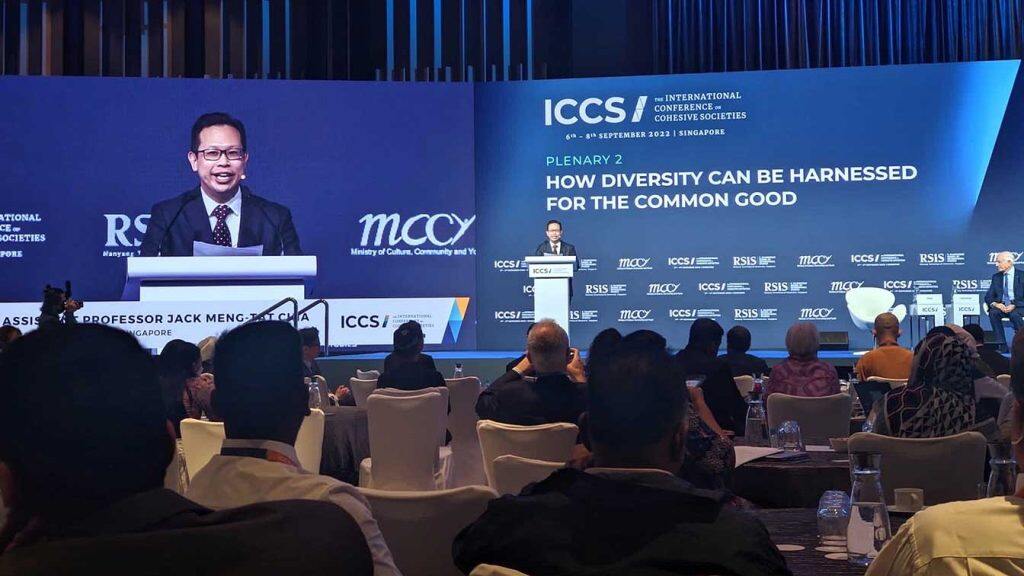NUS Faculty of Arts and Social Sciences (FASS) historian Assistant Professor Jack Chia has been elected a Fellow of the Royal Historical Society (RHS) “in recognition of his contribution to historical scholarship”.


Asst Prof Chia is the third faculty member of NUS History to be elected after Professor Naoko Shimazu and Associate Professor Peter Borschberg. He joins the ranks of other prominent historians awarded the Fellowship, including the former founding director of the NUS Asia Research Institute and historian of Southeast Asia, Anthony Reid; historian of Christianity David Hempton; and historian and archivist Alice Prochaska.
RHS Fellowships are awarded on merit to individuals who have made an original contribution to historical scholarship. Fellows are elected by review and candidates must be supported by an existing Fellow.
“I am honoured and humbled to be elected as a Fellow of RHS in recognition of my work on the history of Buddhism,” said Asst Prof Chia. “Thank you to my mentors and colleagues for their continuous and inspiring support. Election to RHS further encourages me to follow my curiosity about the spread and evolution of Southeast Asian Buddhism and I look forward to new discoveries and contributing to new knowledge of Buddhism in our region.”
Assoc Prof Joey Long, Head of the Department of History shared, “I congratulate Dr Jack Chia for being elected a Fellow of the Royal Historical Society. He is a talented researcher whose pioneering work has changed the way scholars apprehend the history of Buddhism in Asia. I am delighted that Jack’s scholarship has been recognised by such a prestigious body. It is an accomplishment that is so well deserved.”


Photo credit: Elvin Ong.
A historian of religion, Asst Prof Chia’s research focuses on Buddhism and Chinese popular religion. He specialises in Buddhism in maritime Southeast Asia and has broader research interests in migration, diasporas, transnationalism, pilgrimage, and religious diplomacy.
Asst Prof Chia published his first book, Monks in Motion: Buddhism and Modernity Across the South China Sea in 2020, which won the prestigious 2021 EuroSEAS Humanities Book Prize. Exploring the connected history of Buddhist communities in China and Southeast Asia in the 20th century, it is the first study to offer a history of “South China Sea Buddhism”, a form of Buddhism that emerged from a swirl of correspondence networks, forced exiles, voluntary visits, evangelising missions, institution-building campaigns, and the organisational efforts of countless Chinese and Chinese diasporic Buddhist monks. His book was recently translated into Indonesian under the title Kiprah Para Mahabiksu: Agama Buddha dan Modernitas di Asia Tenggara Maritim, and a Chinese translation is underway.
A winner of the FASS 2021/22 Award for Promising Researcher, Asst Prof Chia is an associate of the Religion and Globalisation Cluster at the NUS Asia Research Institute and a steering committee member of the Belt and Road Initiative Cluster at FASS. He co-chairs the Theravada Studies Group of the Association for Asian Studies. He is also an editor of the Asian Culture journal, an assistant editor of Journal of Global Buddhism, and serves on the editorial boards of Contemporary Buddhism, Journal of Southeast Asian Studies, Reading Religion, Studies on Humanistic Buddhism, and Yin-Cheng Journal of Buddhism and Contemporary Society.
Asst Prof Chia is currently working on two book projects: Beyond the Borobudur: Buddhism in Postcolonial Indonesia, and Diplomatic Dharma: Buddhist Diplomacy in Modern Asia which is supported by the 2020 Social Science and Humanities Research Fellowship awarded by the Social Science Research Council Singapore.
About the Royal Historical Society
Founded in 1868, the RHS is the United Kingdom’s (UK) foremost society working for historians and history. In 2022, over 4,500 historians belong and contribute to the Society as fellows and members active in the UK and worldwide.
Click here for more about Asst Prof Chia and his research interests.





































